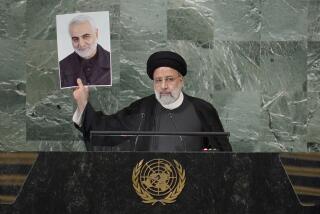Key U.N. Members Say Onus Now on Baghdad
- Share via
UNITED NATIONS — The most important result of Secretary of State Colin L. Powell’s presentation to the United Nations appears to be a subtle but significant shift among Security Council members: The U.S. no longer has something to prove, but Iraq does.
Until this week, skeptics on the Security Council demanded that the U.S. show proof for its claims that Iraq is hiding weapons of mass destruction and seeking parts to make more. Even if all members weren’t fully persuaded by Powell that Iraq holds such weapons, the consensus Thursday was that Iraq must prove it doesn’t.
“We all agree that Iraq is not doing enough,” said Russian Ambassador Sergei V. Lavrov. “The question we are discussing is, what is the step between this situation and war?”
“There is still more that Iraq can do,” Lavrov said. “If Iraq really destroyed its anthrax, it needs to show the documentation. If the documents were destroyed in an air raid, like they say, they need to say where they were kept. The inspectors will report next week whether Iraq is moving in the right direction, and we will wait to hear that.”
The shift in the burden of proof sets the stage for the next crucial step -- a progress report scheduled for Feb. 14. Britain and the U.S. said this week that the report will signal the start of the “final phase” before military action, preferably with the U.N.’s blessing, but possibly without it.
British diplomats are preparing a second Security Council resolution seeking authorization to disarm Iraq by force in the case of a critical, or even neutral, report by inspectors.
“It may be time for the council to swallow hard and take the action they signed up for,” said a British diplomat.
President Bush said Thursday that he would “welcome and support a new resolution,” but stands ready with a coalition of nations to “defend ourselves and disarm the Iraqi regime” without U.N. backing.
France is leading a movement to find an alternative to war. Foreign Minister Dominique de Villepin responded to Powell’s presentation Wednesday with a proposal to contain Iraq by doubling or tripling the number of inspectors and placing full-time monitors at suspected weapons sites.
De Villepin reportedly did not offer more details during a “testy” private meeting later with Powell, but several council members embraced the proposal.
On Thursday, discussion of the French proposal dominated a closed-door Security Council luncheon, diplomats said. France said it will not pursue strengthened inspections until after they hear more from the inspectors next week, and even then may not present a formal proposal.
Lavrov said the inspectors already have the power and the money to do everything the French are proposing.
“If they need more planes, they can get more planes. If they need more inspectors, they can hire more inspectors,” he said.
U.S. Ambassador John D. Negroponte cautioned the council that more inspectors won’t make any difference if Iraq doesn’t cooperate.
“Sooner rather than later, the council is going to have to face up to some difficult decisions,” he said. “Do council members believe that giving the inspections more time will bring about the active cooperation we all seek? Or are they just avoiding facing up to a difficult situation?”
A clearly negative report from chief weapons inspector Hans Blix and Mohamed ElBaradei, the director-general of the International Atomic Energy Agency, would make the council’s decision much easier. But their evaluation is likely to reflect new last-minute actions by Baghdad.
The two men are on their way to Baghdad for a pivotal meeting this weekend to reinforce the message, in the words of Blix, that “it’s five minutes to midnight” for Iraq.
Inspectors are demanding “100% cooperation,” said ElBaradei during a stop in London to meet with Prime Minister Tony Blair and Foreign Minister Jack Straw.
“I think the message coming from the Security Council is very clear: that Iraq is not cooperating fully,” ElBaradei said in front of 10 Downing Street. “They need to show drastic change.”
Blix said the inspectors expected immediate, unconditional consent from Iraq for U2 surveillance flights, action to pass legislation outlawing weapons of mass destruction and more private interviews with scientists.
Blix said earlier this week that those three steps were all actions required by the Security Council’s Resolution 1441, which was passed in November, and would merely indicate that Iraq is finally catching up to its basic obligations. In contrast, he said, pointing the way to hidden weapons or documents about their destruction would constitute progress.
“We hope at this late hour, they will come to a positive response,” Blix said. “If they do not do that, then our reports next Friday will not be what we would like them to be.”
*
Times staff writer Janet Stobart in London contributed to this report.
More to Read
Sign up for Essential California
The most important California stories and recommendations in your inbox every morning.
You may occasionally receive promotional content from the Los Angeles Times.










